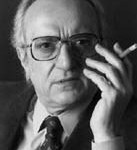The Boden Lecture: The Reconstruction Era Birth of Our Concept of Citizenship
The Declaration of Independence, the United States Constitution, the Civil Rights Act of 1866 – as great as the first two were, it was the third that put in place the concepts of American citizenship and the civil rights of all Americans that are part of the bedrock of American life, prominent historian Eric Foner said in a lecture at Eckstein Hall.
Delivering Marquette Law School’s 2012 Robert F. Boden Lecture last week, Foner focused on the origins in American law of birthright citizenship, the principle that (with immaterial exceptions) anyone born in the United States is a citizen and has basic rights that go with citizenship.
Foner, DeWitt Clinton Professor of History at Columbia University, said many people assume that the principle of “equality under the law” dates back to the origins of the United States – or, as he put it humorously, that the nation was born perfect and has gotten better ever since.
In reality, he said, the nation was definitely not premised on equality under the law in its early stages. For one thing, the Constitution itself did not give citizenship to even free black people, much less to slaves. And, Foner said, citizenship issues were controlled by individual states, rather than the federal government. Every state in the nation had laws that treated black people worse than white people, he noted.
The great changes that declared all men (women’s issues came later) born in America to have basic rights, such as the right to own property and take disputes to court, came with the Civil Rights Act of 1866, put into law by Congress over President Andrew Johnson’s veto, and the subsequent adoption of the Fourteenth Amendment to the Constitution.
The rights extended by those federal enactments and others in the Reconstruction Era were violated with impunity for many decades. But the rights they embraced eventually took hold and came alive in the Civil Rights Era of the mid-twentieth century, Foner said.
Foner said the history of America is a tale of ups and downs, of rights granted and lost. The right to citizenship extended to anyone born in the United States has become controversial in recent years as immigration issues have heated up, he observed. It is a right that arose from the “titanic struggle” of the era of the Civil War and its aftermath, and it was one of the nation’s ways of addressing the legacy of slavery and the pervasive denial of rights to black people. Given how birthright citizenship has served the country, Foner said, “we should think long and hard before changing it.”
A version of Foner’s Boden Lecture will appear in 2013, in the next Marquette Lawyer.


